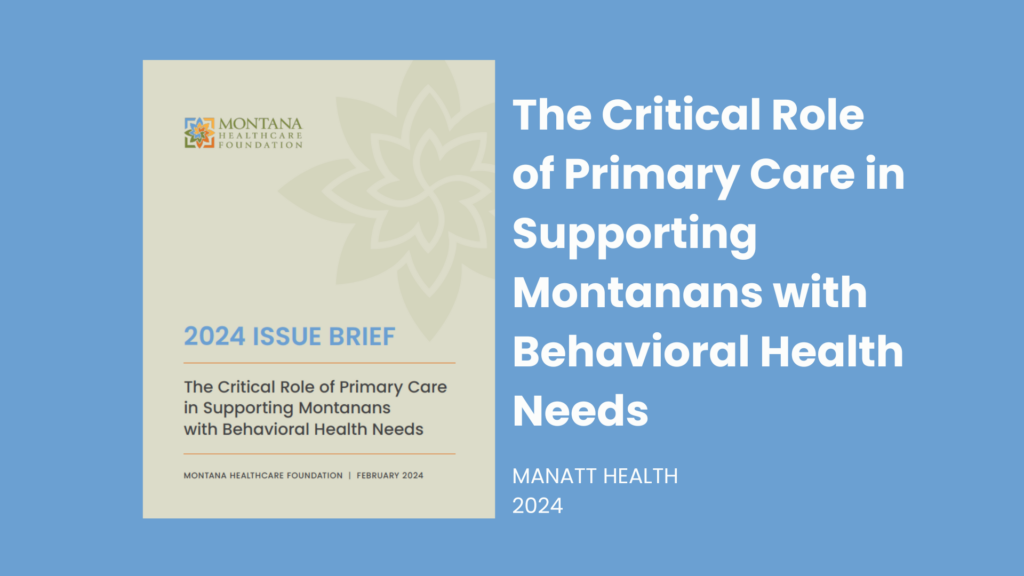
We support primary care practices to screen for and treat behavioral health issues so that Montanans can get many of their behavioral health needs met by their primary care team.
The Integrated Behavioral Health Initiative supports primary care providers in caring for patients’ physical, behavioral, and mental health needs under one roof. Primary care practices in this initiative develop a team-based approach that helps them provide routine screening and prompt, effective care for common issues like depression, anxiety, and substance misuse and builds referral relationships so that people with more severe behavioral health issues can get the care they need without a long wait.
In Montana, primary care providers serve as the first line of treatment for many people with mental illness and substance use disorders. In rural states like Montana, where specialty providers are scarce, more than half of people seek behavioral health care from their primary care provider (source).
“[Primary care is] the provision of whole-person, integrated, accessible, and equitable healthcare by interprofessional teams who are accountable for addressing the majority of an individual’s health and wellness needs across settings through sustained relationships with patients, families, and communities (source).”
The initiative helped integrate behavioral health services into 68 primary care settings across the state.
By the end of 2023, 80% of all adult and pediatric Medicaid patients had access to integrated care in an initiative-funded clinic.
Read our 2022 Annual Report for more highlights!
Participating Sites
Click a map marker to view details for each past or present participating grantee site.
To date, we have helped integrate behavioral health services into 68 primary care clinics across the state, including:
- All 11 large hospitals
- 36 of the 45 critical access hospitals
- Three of the five urban Indian health centers
- All 13 federally qualified health centers
- Three of the eight tribal health departments
- Two independent pediatric clinics
- 79% of adult and 81% of pediatric Medicaid patients receive care in an initiative-funded practice
Learn More
Our Approach
This initiative uses the integrated care model. This team-based approach (also called “integrated care” or “integrated behavioral health”) helps primary care providers incorporate screening for behavioral health issues into regular health maintenance and acute care visits.
In this model, primary care providers partner with or bring behavioral health providers on board and integrate them seamlessly into their workflows. Care coordinators are also incorporated into the health care team and relied on to coordinate patient care and referrals and connect individuals and families to resources that support health, like safe housing, healthy food, and reliable transportation.
Benefits of the integrated care model include:
- Improving Patient Care: Integrated care improves physical and mental health by expanding access to timely behavioral health care and increasing efficiency (source). Studies in youth and adults consistently show a significant improvement in physical and behavioral health outcomes in settings that provide integrated care and reduced utilization of high-cost hospital and emergency department services (source).
- Reducing Health Care Costs: Integrated care allows primary care providers to catch and treat behavioral health issues early, reducing health care costs and improving patient care experiences (source).
- Supporting Health Care Providers: Integrated care makes it easier for providers to offer prompt, effective care for common behavioral health issues. It also improves provider well-being and resilience and reduces burnout (source).
- Solving Montana’s Behavioral Health Provider Shortages: Integrated care allows many behavioral health issues to be identified and treated in primary care, reserving scarce specialty care resources for the most complex cases.
Our Support
In this initiative, we help primary care practices across the state implement integrated care by providing start-up funding and tailored technical assistance. Funding to join the initiative is available to primary care practices that serve a substantial low-income, Medicaid, or other at-risk populations. These include practices based in large hospitals and critical access hospitals, federally qualified health centers, tribal health departments, urban Indian health centers, and rural health clinics.
All grantees participate in our technical assistance program, which provides services tailored to each organization’s needs and helps grantees adopt the evidence-based domains of integrated care using the Comprehensive Healthcare Integration framework.
All funding under this initiative is by invitation only.



